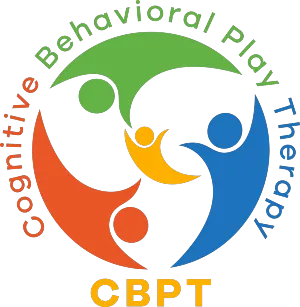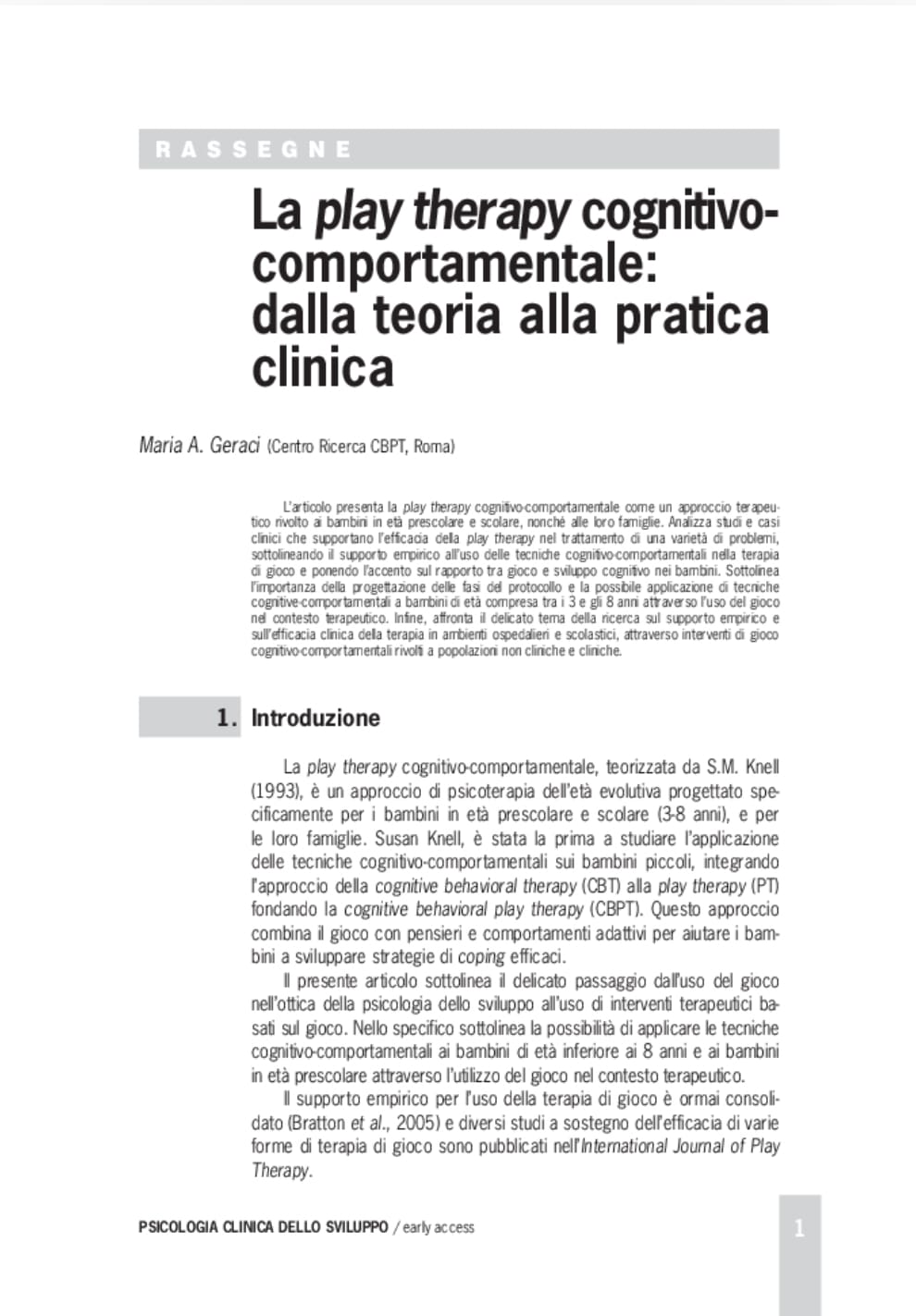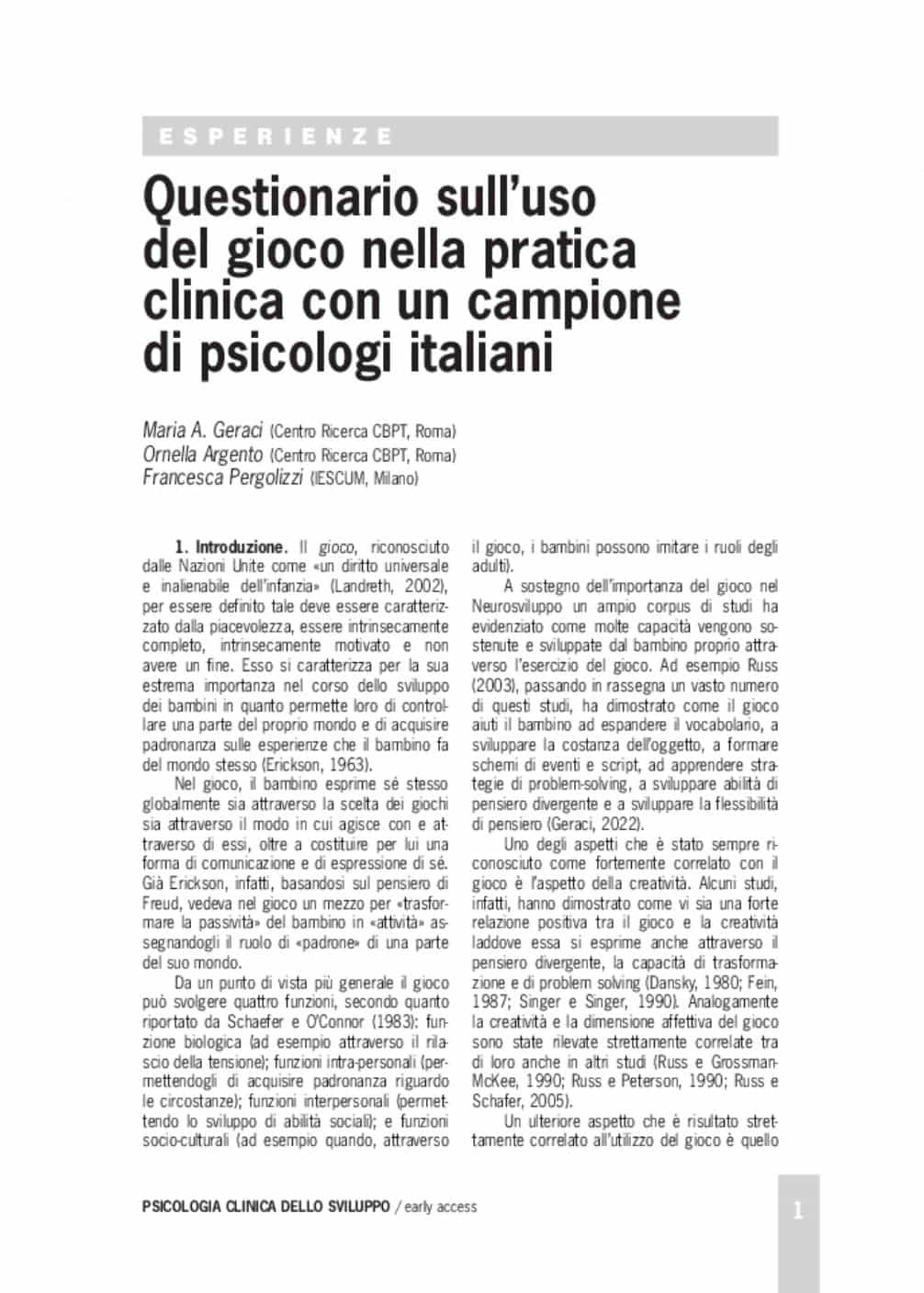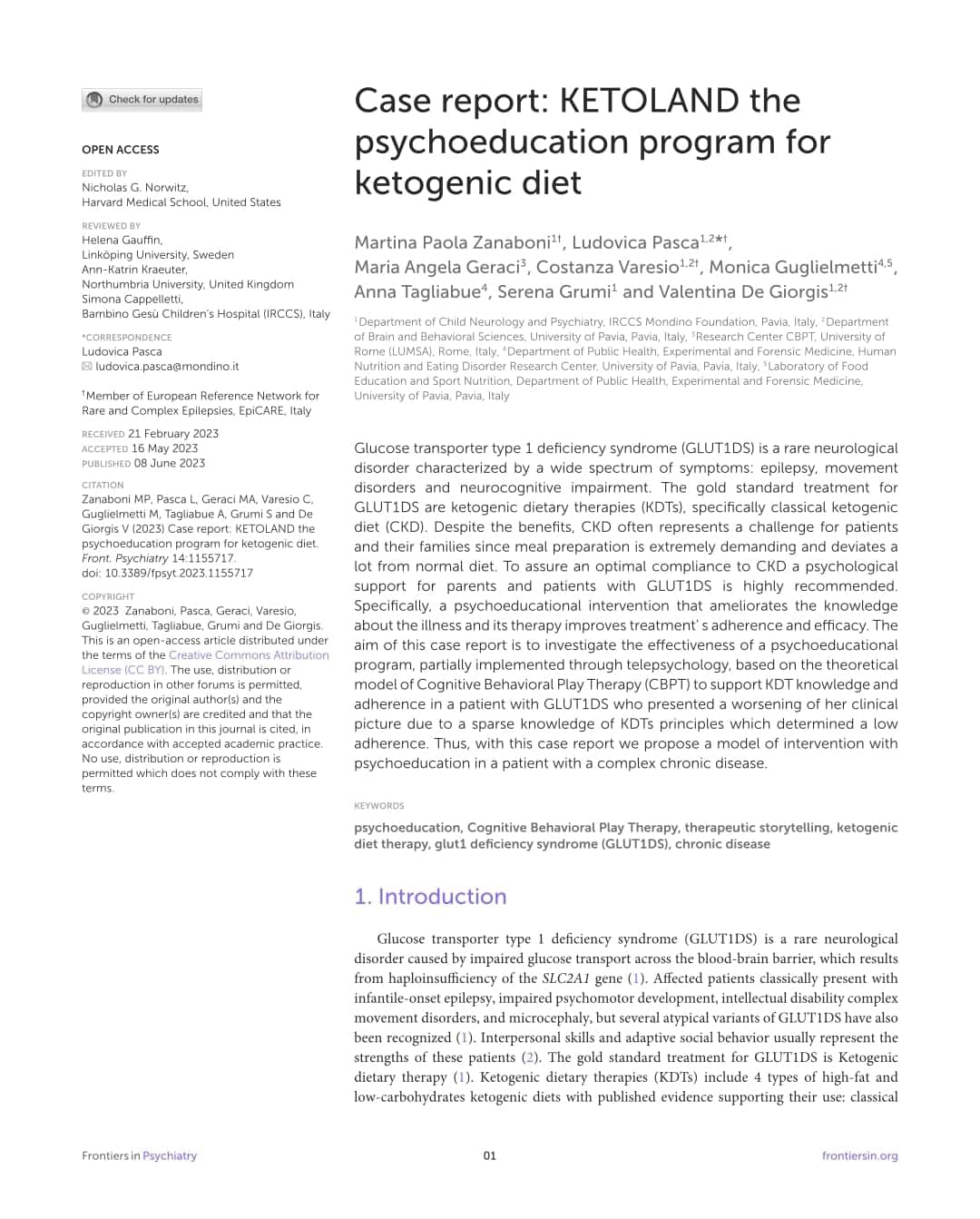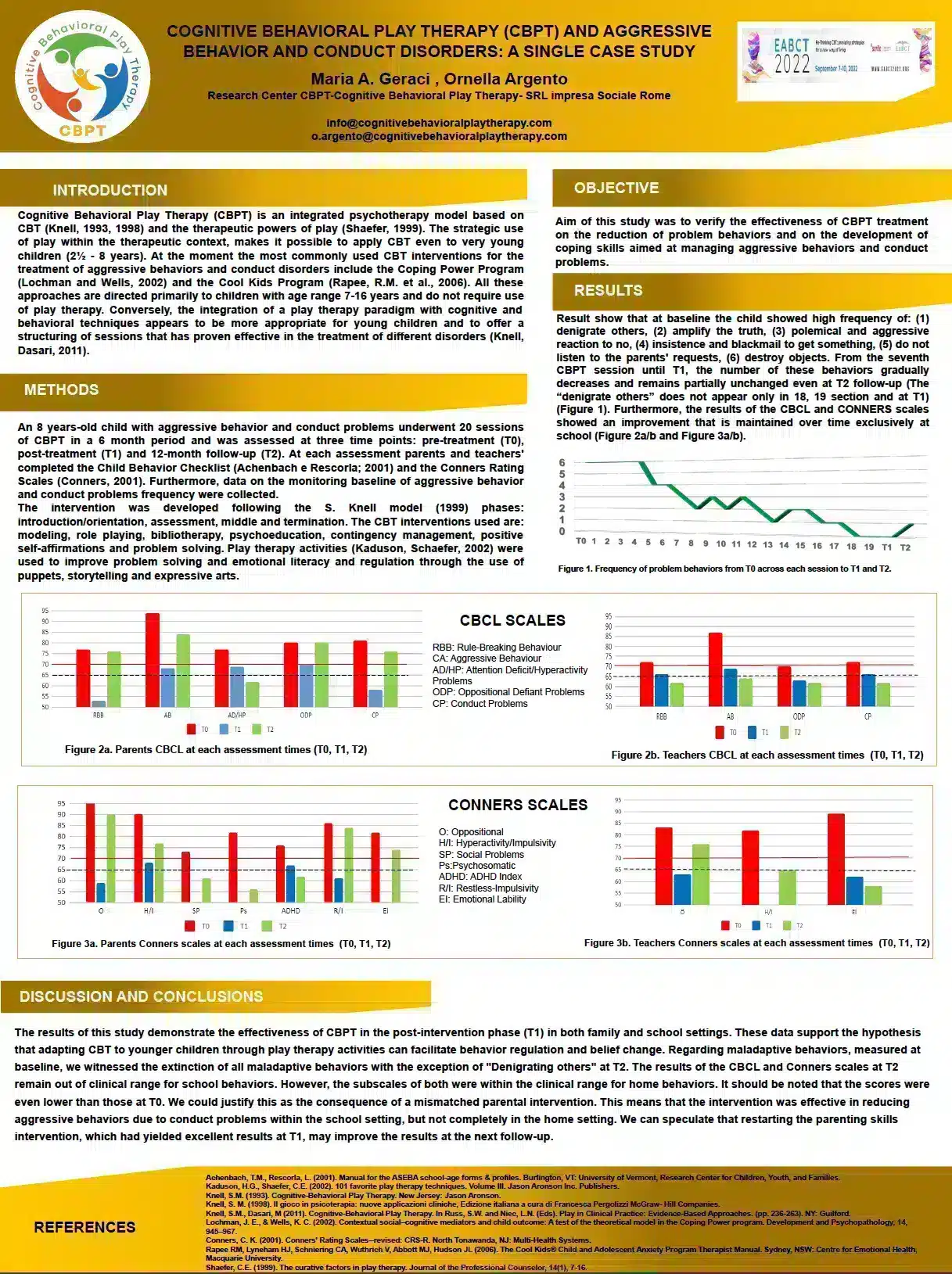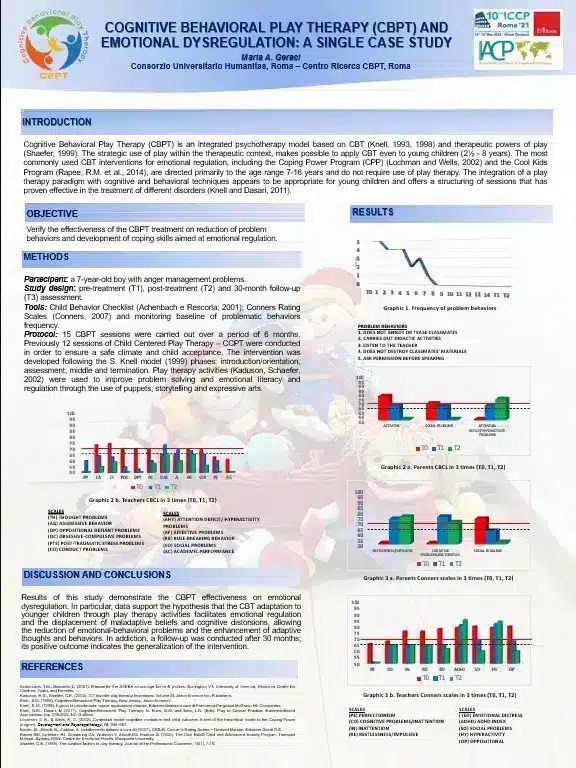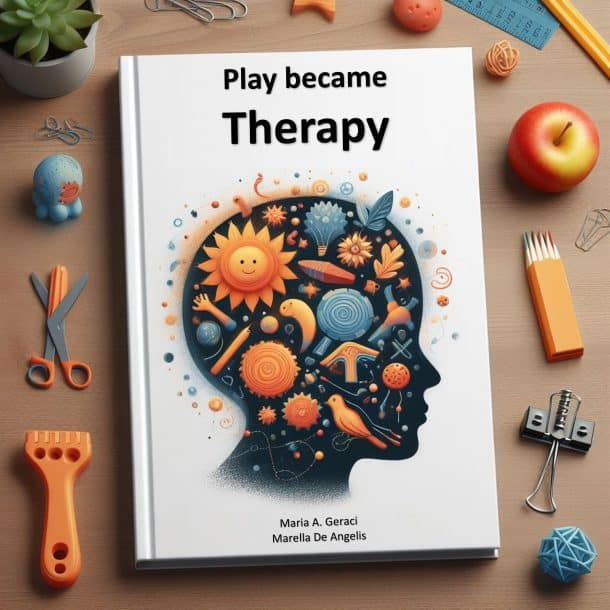SCIENTIFIC ARTICLES ON COGNITIVE-BEHAVIORAL PlAY THERAPY
Geraci, M. A., Knell, S. M., Cavallo, M., & Argento, O. (2025). Cognitive behavioral play therapy: Thirty years of evolution of the theoretical model and future research perspectives. Professional Psychology: Research and Practice, 56(6), 477-487. https://doi.org/10.1037/pro0000646
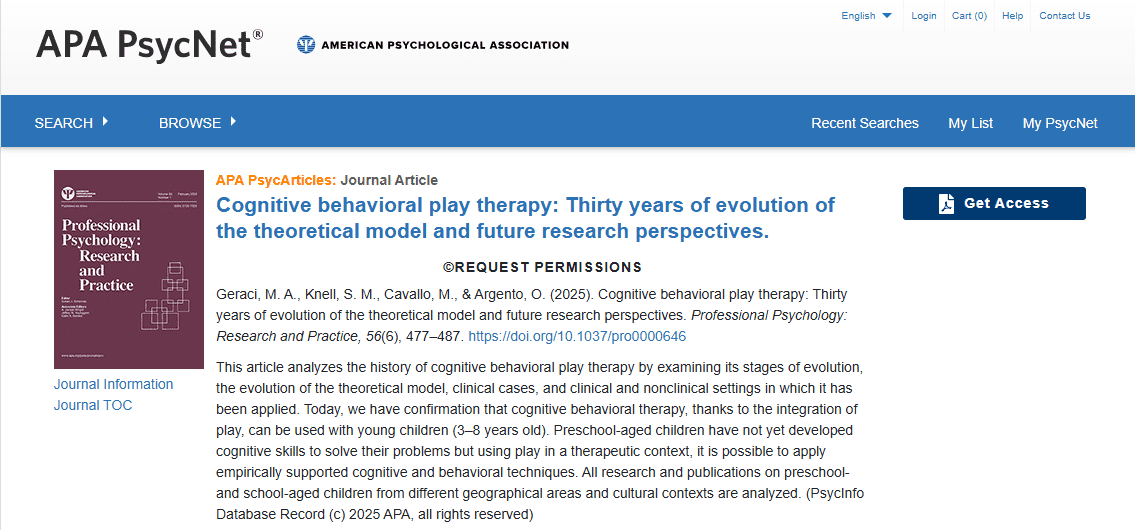
Abstract
This article analyzes the history of cognitive behavioral play therapy by examining its stages of evolution, the evolution of the theoretical model, clinical cases, and clinical and nonclinical settings in which it has been applied. Today, we have confirmation that cognitive behavioral therapy, thanks to the integration of play, can be used with young children (3–8 years old). Preschool-aged children have not yet developed cognitive skills to solve their problems but using play in a therapeutic context, it is possible to apply empirically supported cognitive and behavioral techniques. All research and publications on preschool- and school-aged children from different geographical areas and cultural contexts are analyzed. (PsycInfo Database Record (c) 2025 APA, all rights reserved)
Maria A. Geraci Francesca Romana D’Angelo
Applicazione della “Play Therapy” cognitivo-comportamentale in un caso di ansia da separazione in una bambina di 4 anni e mezzo
pp: 303-313 | DOI: 10.1449/117478
Abstract
The article presents Cognitive Behavioral Play Therapy and demonstrates its application in a case of separation anxiety disorder. Developed by S.M. Knell (1993) and further refined by M.A. Geraci (2022; 2024a), Cognitive Behavioral Play Therapy is a therapeutic approach designed for preschool and school-aged children, integrating cognitive and behavioral therapy techniques with play. This methodology has shown effectiveness in treating anxiety disorders, as shown by the case of Alice, a 4.5-year-old girl experiencing separation anxiety. The therapeutic process followed defined phases: orientation, evaluation, conceptualization, intervention, and conclusion. During the evaluation phase, Alice exhibited inhibited behavior; however, play facilitated emotional expression. Additionally, a parent training program gave parents strategies to manage Alice’s behaviors. Over the course of 25 sessions of cognitive behavioral play therapy, carried out over 9 months, CBT techniques such as modeling, role-playing, and psychoeducation were implemented to cultivate adaptive coping skills. Follow-up assessments at 3 and 6 months indicated significant improvements, with anxiety levels normalized and a restart of activities such as dancing, thereby affirming the therapy’s effectiveness and underlining the need for further research on this therapeutic approach.
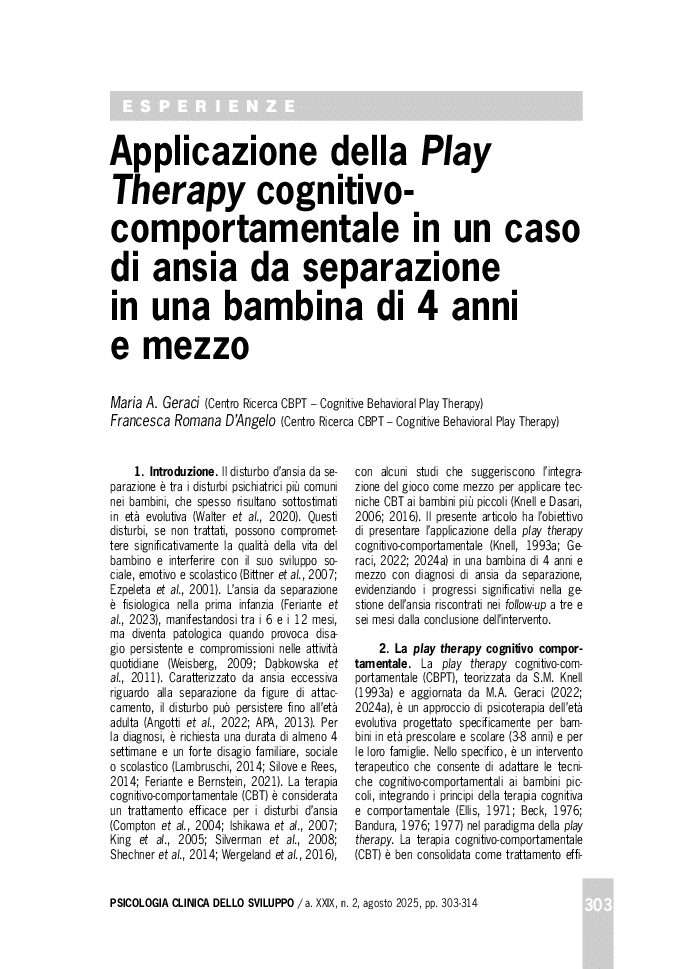
EARLY ACCESS
Maria A. Geraci
Cognitive-behavioral Play Therapy: from theory to clinical practice
pp: 1-36 DOI: 10.1449/113493
Abstract
The article presents cognitive-behavioral play therapy as a therapeutic approach directed at preschool and school-aged children, as well as their families. It analyzes studies and clinical cases that support the efficacy of play therapy in treating a variety of problems, highlighting the empirical support for the use of cognitive-behavioral techniques in play therapy.
Maria A. Geraci, Ornella Argento, Francesca Pergolizzi, Questionnaire on the use of play in clinical practice with a sample of Italian psychologists, in “Clinical Developmental Psychology, Quarterly Journal” 1/2024, pp. 145-158, doi: 10.1449/112823
Abstract
Play, universally recognized as an inalienable right of childhood by the United Nations, is defined by its pleasantness, completeness, intrinsic motivation, and lack of a predetermined goal. It plays a crucial role in child development, empowering children to exert some control over their environment and gain mastery over their experiences of the world.
Zanaboni MP, Pasca L, Geraci MA, Varesio C, Guglielmetti M, Tagliabue A, Grumi S, De Giorgis V. Case report: KETOLAND the psychoeducation program for ketogenic diet. Front Psychiatry. 2023 Jun 8;14:1155717. doi: 10.3389/fpsyt.2023.1155717. PMID: 37363168; PMCID: PMC10285047.
Abstract
Glucose transporter type 1 deficiency syndrome (GLUT1DS) is a rare neurological disorder characterized by a wide spectrum of symptoms: epilepsy, movement disorders and neurocognitive impairment. The gold standard treatment for GLUT1DS are ketogenic dietary therapies (KDTs), specifically classical ketogenic diet (CKD). Despite the benefits, CKD often represents a challenge for patients and their families since meal preparation is extremely demanding and deviates a lot from normal diet. To assure an optimal compliance to CKD a psychological support for parents and patients with GLUT1DS is highly recommended. Specifically, a psychoeducational intervention that ameliorates the knowledge about the illness and its therapy improves treatment’ s adherence and efficacy. The aim of this case report is to investigate the effectiveness of a psychoeducational program, partially implemented through telepsychology, based on the theoretical model of Cognitive Behavioral Play Therapy (CBPT) to support KDT knowledge and adherence in a patient with GLUT1DS who presented a worsening of her clinical picture due to a sparse knowledge of KDTs principles which determined a low adherence. Thus, with this case report we propose a model of intervention with psychoeducation in a patient with a complex chronic disease.
COGNITIVE BEHAVIORAL PLAY THERAPY AND AGGRESSIVE BEHAVIOR AND CONDUCT DISORDERS: A SINGLE CASE STUDY.
Goals
The present study presented at the EABCT 2022 congress – 52nd European Association for Behavioural and Cognitive Therapies – Barcelona, 7-10 September 2022, aims to verify the effectiveness of CBPT treatment on the reduction of problem behaviors and on the development of coping skills aimed at managing aggressive behaviors and conduct problems.
Case study
It’s 8-year-old child with aggressive behavior and conduct problems underwent 20 sessions of CBPT over a 6-month period and was evaluated at three time points: pre-treatment (T1), post-treatment (T2) and 12-month follow-up (T3). At each assessment, parents and teachers completed the Child Behaviour Checklist (Achenbach and Rescorla; 2001) and the Conners Rating Scales (Conners, 2007). In addition, data were collected on baseline monitoring of aggressive behavior and frequency of conduct problems.
Intervention
The intervention was developed following the phases of the S. Knell (1999) model: introduction/orientation, assessment, intermediate and conclusion. Play therapy activities (Kaduson, Schaefer, 2002) were used to improve problem solving and literacy and emotional regulation through the use of puppetry, storytelling and expressive arts.
Results
The results of this survey showed that Play turns out to be an essential element in the clinical practice of Italian psychotherapists, especially those with a CBT orientation, as it can be used for all ages, at different stages of the therapeutic path and with different purposes. The survey underscores the great interest in the use of play.However, this survey also highlights the lack of knowledge about how play can be applied within developmental cognitive-behavioral psychotherapy.
COGNITIVE BEHAVIORAL PLAY THERAPY (CBPT) AND EMOTIONAL DISREGULATION: A SINGLE CASE STUDY
Goals
The present work presented at ICCP 2021: 10th International Congress of Cognitive Psychotherapy – VIRTUAL CONGRESS, 13th-15th May 2021 aims to verify the effectiveness of CBPT treatment on the reduction of problem behaviors and on the development of coping skills aimed at emotional regulation.
Case study
This is the case of a 7-year-old boy with anger management problems. The study design: pre-treatment (T1), post-treatment (T2) and 30-month follow-up (T3) evaluation. The tools used are Child Behavior Checklist (Achenbach and Rescorla; 2001); Conners Rating Scales (Conners, 2007) and monitoring the baseline frequency of problem behaviors.
Intervention
The intervention protocol was structured in 15 CBPT sessions over a 6 month period. Previously 12 Child Centered Play Therapy – CCPT sessions were conducted to ensure a safe climate and child acceptance. The intervention was developed following the steps of the S. Knell model (1999): introduction/ orientation, evaluation, development and conclusion.
Results
Play therapy activities (Kaduson, Schaefer, 2002) have been used to improve problem solving, literacy, and emotional regulation through the use of puppetry, storytelling and expressive arts.
